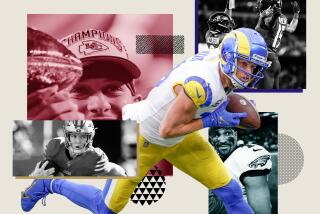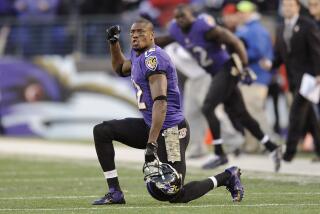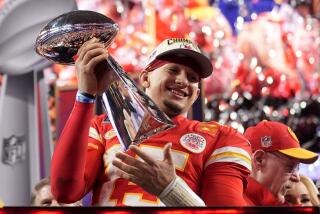Giants produce Super stopper
GLENDALE, ARIZ. — It was supposed to be a coronation, a glittering moment in a perfect season for the New England Patriots.
Then the New York Giants stole the crown.
With a bullying defense and a last-minute touchdown drive, the underdog Giants engineered one of the most shocking upsets in football history, defeating New England, 17-14, in Super Bowl XLII on Sunday night.
Their victory ended the Patriots’ bid for the first 19-0 season in National Football League history and a fourth championship in seven years.
“We didn’t treat them like a myth,” New York receiver David Tyree said. “There was no Godzilla factor.”
Not since Joe Namath and the upstart New York Jets won Super Bowl III over the heavily favored Baltimore Colts in 1969 had football’s grandest stage presented such an unexpected outcome.
The game completed an unlikely resurrection for a New York team that started the season 0-2, their coach’s job in jeopardy and their young quarterback, Eli Manning, a target of fans and the media because of his propensity for interceptions.
“The run we’ve made -- it’s hard to believe,” said Manning, who was voted the game’s most valuable player.
The Patriots, meanwhile, came off the field with the dazed look of a team that had fallen a minute short of making history.
They had outscored opponents by a record 315 points this season and were picked to defeat the Giants by 12, making them the fourth-biggest favorite in Super Bowl history.
“That was a tough game,” New England Coach Bill Belichick said. “Not the way we expected it.”
New England joins a short list of teams that have failed to achieve historic victories.
Two years ago, the USC Trojans went into college football’s national championship game against Texas with a 12-0 record and a shot at an unprecedented third consecutive title. They lost.
Further back in NFL history, the Chicago Bears went undefeated in the regular seasons of 1934 and ’42 before losing in the championship game.
Only the Miami Dolphins, who went 17-0 in 1972, can lay claim to an undefeated season in pro football’s modern era.
For the first three quarters of Sunday night’s game, played before a crowd of 71,101 at University of Phoenix Stadium, the Patriots looked poised to join them.
They scored on their opening drive, running back Laurence Maroney pushing over from a yard out. The Giants could manage nothing more than an early field goal.
But defense kept New York close.
The Giants’ league-leading pass rush was in quarterback Tom Brady’s face all night, sacking him five times and hurrying him on numerous other occasions.
It was something of a shock for Brady, who had thrown a record 50 touchdown passes during the regular season, and receiver Randy Moss, who had caught a record 23 of them.
“Their intensity,” Moss said. “From the beginning snap to the end of the game, we just couldn’t match their intensity.”
For all the success that New England had enjoyed on the field during the regular season and the playoffs -- people talking about them as perhaps the best team ever -- their season had not been easy.
The Patriots’ star defensive player, safety Rodney Harrison, was suspended for the first four games after admitting to investigators that he had obtained human growth hormone, a banned substance in the NFL.
Then came the much-publicized “Spygate.”
In the season opener against the New York Jets, a Patriots assistant was caught videotaping Jets coaches as they signaled formations from the sideline to their defense on the field. Stealing signals with the naked eye is permitted by the league, but videotaping is not.
The commissioner took away the team’s first-round pick in the next draft and levied a $750,000 fine -- $500,000 of which had to be paid by head coach Belichick.
The scandal reignited this week when Sen. Arlen Specter (R-Pa.) demanded that league officials explain why they destroyed videotapes and other evidence from their investigation into the matter.
Then the Boston Herald quoted an anonymous source close to the team as saying the Patriots had videotaped a St. Louis Rams walk-through before their first Super Bowl victory, in 2002.
More to the point, Brady had suffered an ankle injury two weeks ago.
Whatever the reason, when the fourth quarter began with New England leading, 7-3, it was New York that made most of the crucial plays.
The teams traded touchdowns, Manning throwing a five-yard scoring pass to Tyree and Brady answering with a six-yarder to Moss, drawing roars from a capacity crowd split in its allegiance.
New England led, 14-10, with 2:42 remaining, just enough time for Manning and Tyree to produce the game’s biggest play.
Swarmed by Patriots rushers, Manning broke free and heaved a pass downfield, where Tyree outjumped a defender, trapping the ball against his helmet for a 32-yard catch.
“An unbelievable catch,” Manning said.
Four plays later, the quarterback stared down a rush of oncoming defenders and threw a 13-yard fade pass to receiver Plaxico Burress for the winning touchdown with 35 seconds remaining.
Manning’s performance came a year after his older brother, Peyton, led the Indianapolis Colts to a Super Bowl victory. The younger Manning tried to downplay his effort, saying: “We just kind of made enough plays.”
It was up to Tom Coughlin, the Giants’ quiet, tough-minded head coach, to provide the hyperbole. “You could walk around 6 feet high,” he said, describing how it felt to pull off the upset, “and that would be appropriate.”
--
More to Read
Go beyond the scoreboard
Get the latest on L.A.'s teams in the daily Sports Report newsletter.
You may occasionally receive promotional content from the Los Angeles Times.











